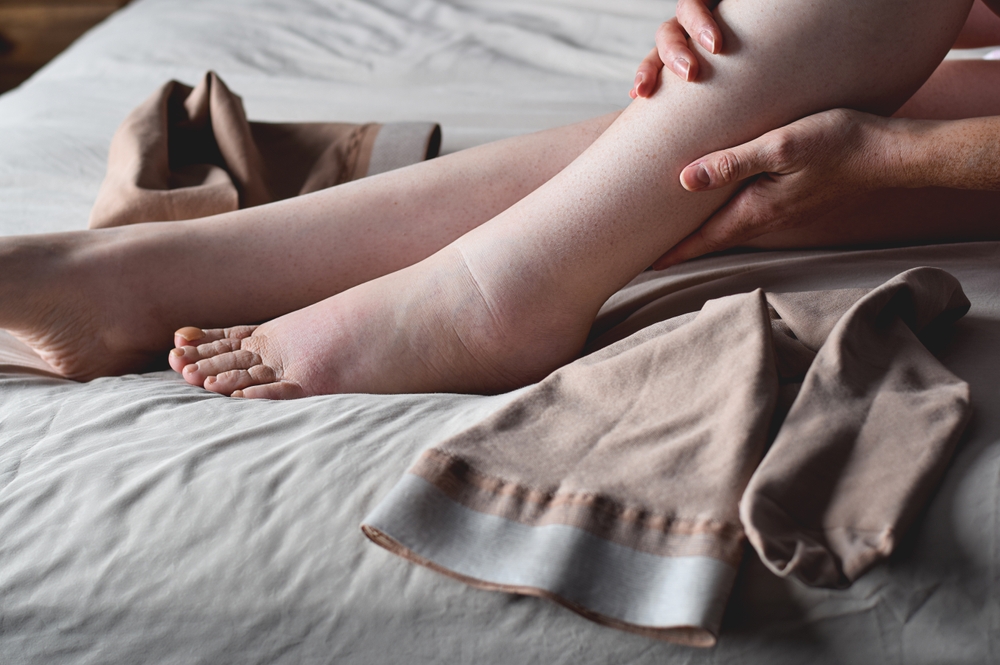Experiencing unexplained swelling in an arm or leg can be concerning. This is a primary indicator of lymphedema, a condition that occurs when the lymphatic system is compromised. Understanding the common signs and symptoms of lymphedema is the first step toward managing it effectively. This condition results from a blockage in your lymphatic system, preventing lymph fluid from draining properly. While there are various lymphedema causes, recognizing the symptoms early is key to preventing complications. If you notice persistent swelling, it is important to seek a professional diagnosis from a provider such as a vascular health specialist. Get a consultation with the best vascular disease specialists in Brooklyn.
Understanding the Common Signs and Symptoms of Lymphedema
Lymphedema typically affects an arm or a leg, but it can also occur in the chest, head, or genitals. The symptoms can range from mild and barely noticeable to severe, causing significant discomfort and changes in the affected limb. Paying attention to these signs is crucial for early intervention.
Primary Symptoms to Watch For
The initial signs of lymphedema can be subtle, but they tend to progress if left untreated.
- Swelling (Edema): The most common symptom is swelling in part or all of a limb. In the early stages, this swelling may be soft and go down overnight, but it can become more persistent and firm over time.
- A Feeling of Heaviness or Tightness: The affected arm or leg may feel full, heavy, or tight. Clothing or jewelry, like rings and watches, might feel unusually snug.
- Restricted Range of Motion: As swelling increases, it can become difficult to move the affected joint or limb as freely as you once could.
- Aching or Discomfort: A dull ache or discomfort is common in the affected area. This is different from sharp pain but can be a constant source of irritation.
Progressive and Advanced Signs
If lymphedema is not managed, it can lead to more serious symptoms and complications.
- Skin Changes: The skin over the affected area can thicken and harden, a condition known as fibrosis. It may also take on a texture similar to an orange peel.
- Recurring Infections: The buildup of lymph fluid can make the affected limb more susceptible to infections like cellulitis, a bacterial skin infection.
- Hardening and Thickening of the Skin: Over time, the skin can become very hard and thick, and the limb may become significantly larger and heavier.
- Leakage of Lymph Fluid: In severe cases, the skin may crack and allow lymph fluid to seep out, a condition called lymphorrhea.
What Are the Primary Lymphedema Causes?
Lymphedema is categorized as either primary or secondary, depending on its cause. Understanding the origin of the condition is important for developing an effective management plan with a vascular health specialist.
Primary Lymphedema
This is a rare, inherited condition caused by developmental problems in the lymph vessels. The signs of primary lymphedema can develop at birth, during puberty, or in adulthood, often without an obvious cause.
Secondary Lymphedema
This is far more common and is the result of damage or obstruction to an otherwise healthy lymphatic system. Common lymphedema causes for the secondary type include:
- Cancer Treatment: The removal of or damage to lymph nodes and vessels during cancer surgery or radiation therapy is the most frequent cause of secondary lymphedema.
- Infection: Severe bacterial or parasitic infections can damage the lymph vessels and lead to lymphedema.
- Injury: Trauma, burns, or other injuries that damage the lymphatic system can trigger the condition.
- Vascular Diseases: Conditions that affect blood flow, such as deep vein thrombosis (DVT) or chronic venous insufficiency, can increase the risk of developing lymphedema.
When to Seek Professional Help
If you experience persistent swelling or any other symptoms of lymphedema, it is crucial to consult a healthcare provider for an accurate diagnosis. Early diagnosis and treatment can help manage symptoms and reduce the risk of complications. Your doctor may refer you to a specialist for further evaluation and treatment.
A qualified vascular health specialist can perform a physical exam and may order imaging tests to confirm the diagnosis and assess the condition of your lymphatic system. For those in New York, a vascular clinic in Brooklyn can provide comprehensive diagnostic and management services. These clinics are equipped to handle complex vascular and lymphatic conditions.
Managing Lymphedema
While there is no cure for lymphedema, it can be effectively managed with a comprehensive treatment plan. The goal of treatment is to reduce swelling, improve mobility, and prevent complications. Common management strategies include compression garments, manual lymphatic drainage (a type of massage), exercise, and meticulous skin care.
Visiting a specialized vascular clinic in Brooklyn can provide you with access to certified lymphedema therapists and a multidisciplinary team to create a personalized care plan.
Recognizing the signs and symptoms of lymphedema is the first step toward regaining control of your health. With the right medical support and a proactive approach to management, you can lead a full and active life. If you have concerns about swelling or other symptoms, don’t hesitate to seek professional medical advice. For any vascular problems, call us on + 1-718-367-2555. The Vascular Disease Specialists at Doral Health & Wellness consistently have outstanding patient satisfaction ratings. The professionals at Doral Health & Wellness Vascular Health Department Brooklyn can improve your health and quality of life because of their vast training and experience. New Yorkers can get the greatest medical and surgical vascular care at Doral Health & Wellness Brooklyn. If you need help, register your information and make direct contact with our doctors at https://yuz88hfiyh7.typeform.com/Doralintake or send an email to info@doralhw.org. Visit us at 1797 Pitkin Avenue, Brooklyn, NY 11212.






